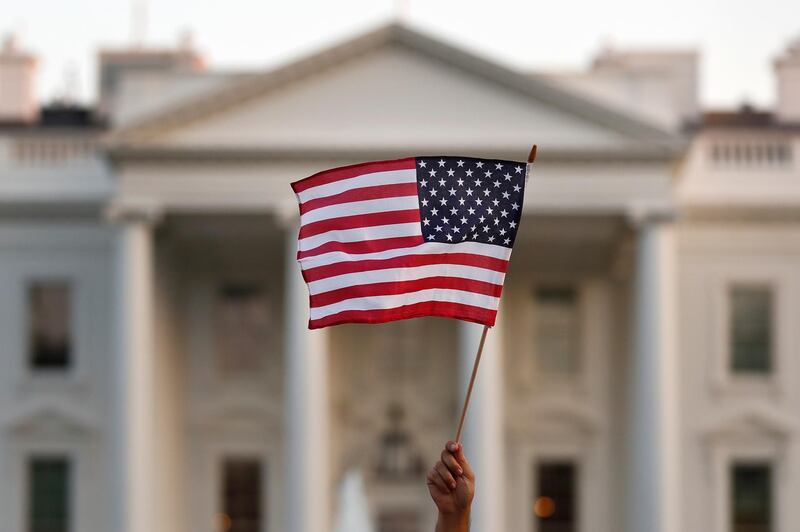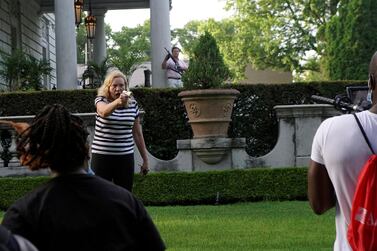There are 100 days to go until the US presidential election on November 3.
74-year-old Republican incumbent President Donald Trump will try to shock the pundits once more by winning re-election in the face of a daunting recession and low approval ratings.
President Trump will face the challenging task of staying in office as he runs against 77-year-old presumptive Democratic nominee and former US Vice President Joe Biden, no stranger to the general public with several attempted presidential runs in his past and a lengthy career in the US Senate.
Most national polls show Mr Biden with a lead, but as Hillary Clinton will attest to from her 2016 bid, US presidential elections are fought for and won state by state. Ms Clinton won 2.8 million more votes than Mr Trump, but lost several crucial states as she watched the Republican nominee cruise past the necessary 270 electoral votes on his way to the White House.
As the race intensifies and voter preferences are solidified, both Mr Trump and Mr Biden will run amid an increasingly anxious public facing a deadly pandemic, economic pain and increasing polarisation on just about every issue. Here’s where things stand.
Polls show Biden in the lead, but Trump still has advantages
A Quinnipiac University poll shows voters backing Mr Biden over President Trump 52 - 37 per cent, giving Mr Biden a 15 per cent lead.
That particular poll is not an anomaly. Most polling organisations currently show Mr Biden with a significant lead over the current occupant of the White House.
The Trump campaign, however, has been quick to point out a lingering skepticism from 2016 polls, some of which showed Trump unlikely to take the White House.
Those 2016 polls in the months and weeks leading up to that election have been the subject of intense scrutiny and research.
Dr Peter Yacobucci, associate professor of political science at Buffalo State University, said polls from 2016 were unfairly criticised.
“The final polls in the field were conducted the weekend before the election and they showed a significant shift toward Trump with nearly 4 out of 5 undecideds moving toward Trump in the last five days,” he said, while at the same time emphasising the polling 100 days before the election might be less reliable than looking at overall fundamentals such as the state of the economy and other factors.
According to the Pew Research Center, a non-partisan organisation which focusses on trends, public opinion and polling, Mr Biden has a significant advantage among registered voters in terms of personal traits when voters were asked which candidate was more 'even tempered'. On the issues of caring about the needs of ordinary people, being a good role model and being honest, Mr Biden holds leads as well, although his lead is not as commanding in those areas.
In that same survey data, however, Mr Trump holds a key advantage: energy. “This is Trump’s most positive attribute in the eyes of voters,” reads the report from Pew.
Some have argued that energy alone is what propelled Mr Trump to the White House in 2016, when the enthusiasm of his supporters proved to sustain throughout the campaign.
That solid support, although softening in some areas, is still formidable, whereas enthusiasm for Mr Biden has not reached those levels.
“Among registered voters who say they would vote for Donald Trump, a large majority (76 per cent) say that their choice of Trump is more a vote for Trump, while just 24 per cent say their choice is more of a vote against Biden,” reads the Pew report.
For Mr Biden, according to Pew, 67 per cent say their choice is more of a vote against Mr Trump.
In terms of bringing the country together, making good foreign policy decisions, and handling the coronavirus outbreak, Pew’s survey shows Mr Biden with advantages over Mr Trump in the eyes of voters, while Trump holds an important, albeit slight lead on what some say is still the paramount issue, the economy.
Battleground states
In 2016, then-candidate Mr Trump shocked the world by winning states widely considered to be part of Ms Clinton’s firewall to the White House. He won Pennsylvania, Wisconsin, Michigan, Florida and Ohio, all of which were won by Barack Obama in 2008 and 2012.
This time around, however, most polls show Mr Biden in the lead in several of those states, especially Michigan, Wisconsin and Pennsylvania. If those trends hold for Democratic nominee, he will surpass the 270 electoral votes needed to win the White House.
Dr Yacobucci also notes that Mr Biden has been polling well in Florida and Ohio. If that persists, he said, Trump could find himself on the defensive in the same way that Hillary Clinton was in final days leading up the 2016 election.
Battleground Ohio: #JoeBiden, #PresidentTrump locked in tight race; #GovMikeDeWine approval surges to record high https://t.co/XwS4PU8jLD #2020Election
— Quinnipiac University Poll (@QuinnipiacPoll) June 24, 2020
“If Trump loses Florida, he would almost certainly need to run the table in all of the swing states,” said Dr Yacobucci. “The explosion of Covid-19 cases in Florida, which also has a Republican governor, is a big problem for the Trump campaign.”
Dr Yacobucci, however, was quick to echo the possible concerns about the enthusiasm gap referred to in the Pew Survey, while adding a caveat.
“There is a clear enthusiasm gap for Biden among younger voters, but also add in the enthusiasm to vote against an opponent,” he added, noting that the enthusiasm gap could cut several ways, especially if anti-Trump sentiment proves to be a powerful factor.
The enthusiasm could vary from state to state, adding another variable that might ultimately affect the electoral college results and ultimately decide who takes the White House.
In addition to traditional battleground states, demographic shifts are also starting to shift the US political map.
Dr Timothy Kneeland, chair of history and political science at Nazareth College in Rochester, told The National that the state of Georgia, a reliably Republican state since 1980, is starting to reflect those changes.
“We could see an upset there,” said Dr. Kneeland, who also emphasised a democratic candidate for governor in the state, Stacy Abrams, came within 50,000 votes of beating a Republican. “And Abrams is now being considered by the Biden campaign as a potential running mate.”
Unprecedented Factors
Quite simply, these are unprecedented times leading up to a US presidential election. Chief among the factors making this race for the White House so different is the Covid-19 pandemic.
It remains to be seen exactly how coronavirus will affect the election. Several states have opted to allow mail-in ballots for the general population, but those initiatives have not come without legal challenges.
Will US voters be comfortable waiting in lines to vote amid potential health risks? Recent local elections held in Georgia, Wisconsin and Kentucky have already seen restrictions affecting the amount of polling locations.
Dr Yacobucci said the fallout from a fewer polling locations could be felt across the board.
“This could suppress votes in traditionally democratic leaning areas, but it could also ironically hurt down-ballot Republicans in more rural areas,” he said.
There’s also the psychological toll of the pandemic mixed with economic uncertainty that’s proven to make for an unpredictable electorate.
“The share of the public saying they are satisfied with the way things are going in the country has plummeted from 31 per cent in April, during the early weeks of the coronavirus outbreak, to just 12 per cent today,” read the Pew Research Survey from mid-June.
In that same survey, approximately 54 per cent of registered voters indicated they would support Mr Biden, with 44 per cent leaning toward Mr Trump.
There’s still plenty of time, however, and hundreds of millions of dollars will be spent to try and change minds in the months ahead.
Federal Election Commission filings show the Biden campaign with $82 million cash on hand, while Trump's campaign has $108 million. In total, Mr Trump's campaign has out-raised Biden, with the exception of May and June, where Biden's campaign raising more.
Keep in mind this doesn't include issue ads from interest groups, political action committees or other entities which will also throw around millions of dollars.
The negative campaigning from all angles will certainly be kicked into high gear onto an electorate already feeling tense and torn about the future of the country.
Indeed, all of this influence will cause the polls to change in the weeks ahead, but make no mistake, the campaign is already well under way.
To put it simply, the White House is still within reach of Mr Biden or Mr Trump.








